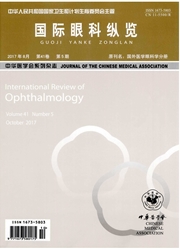

 中文摘要:
中文摘要:
青光眼是一组由病理性眼压升高导致进行性视网膜神经节细胞凋亡和视野缺损的眼病,通过延缓视网膜神经节细胞(retinalganglioncells,RGC)凋亡进度对受损视神经进行保护是青光眼研究领域的重要方向。近几年在对视神经保护的药物研究中,促红细胞生成素(erythropoietin,EPO)受到广泛关注。EPO通过与红细胞膜表面的促红细胞生成素受体( erythropoietin receptor,EPOR)结合,抑制不同的细胞信号转导通路(如HIF-1/iNOS通路、RhoA/ROCK通路等),从而抑制细胞内诱导凋亡发生的Bax/Bcl-2等复合物的形成,发挥视神经保护作用。
 英文摘要:
英文摘要:
Glaucoma is an optic neuropathy characterized by optic degeneration, apoptosis of retinal ganglion cells ( RGC ), and visual field loss. A major risk factor for the disease is pathological elevation of in-traocular pressure. Now it is the second leading cause of blindness worldwide. To delaying the apoptosis of retinal ganglion cells (RGC) and to protecting injured optic nerve have aroused considerable attention in the field of glaucoma research. The researches on treating glaucoma have been focused on erythropoietin (EPO) in recent years. Studies have indicated that EPO can inhibit the apoptosis of RGC. EPO binds to its specific receptor (erythropoietin receptor, EPOR) , then suppress different pathways (HIF-1 iNOS, RhoA/ROCK) and inhibits formation of the Bax/Bcl-2 complex to protect RGC.
 同期刊论文项目
同期刊论文项目
 同项目期刊论文
同项目期刊论文
 期刊信息
期刊信息
